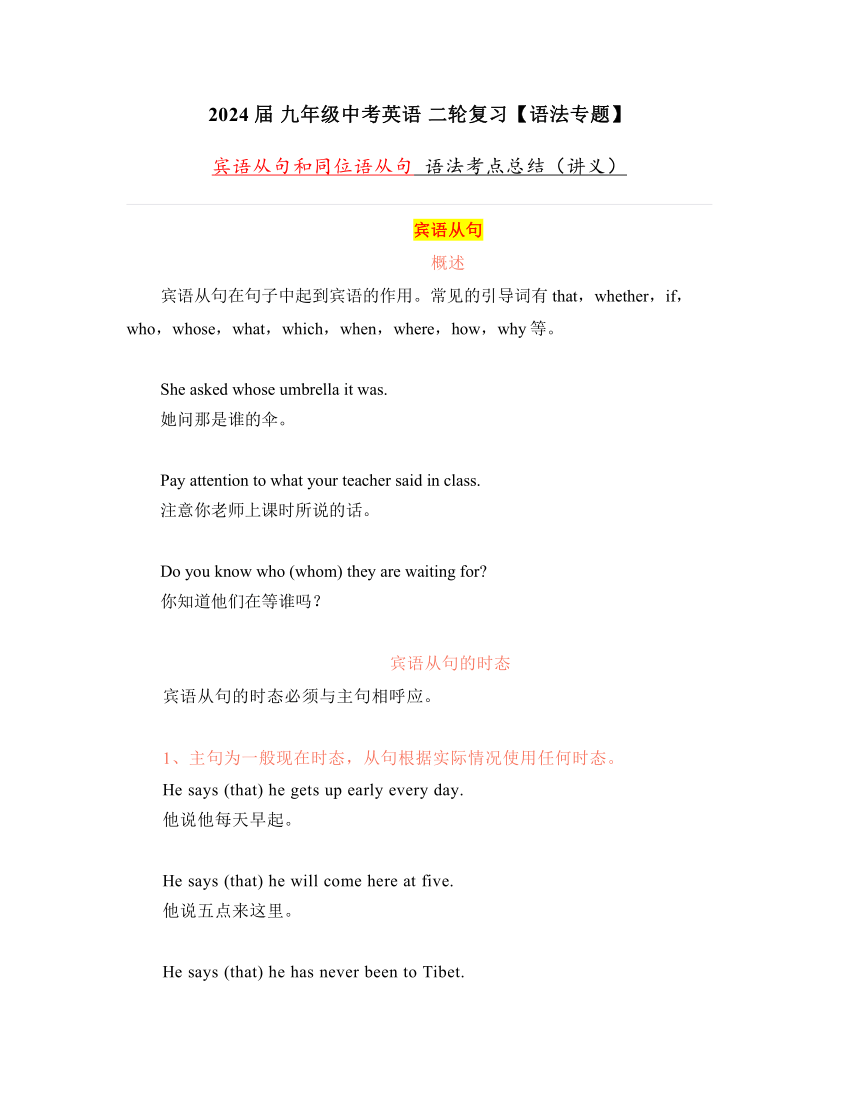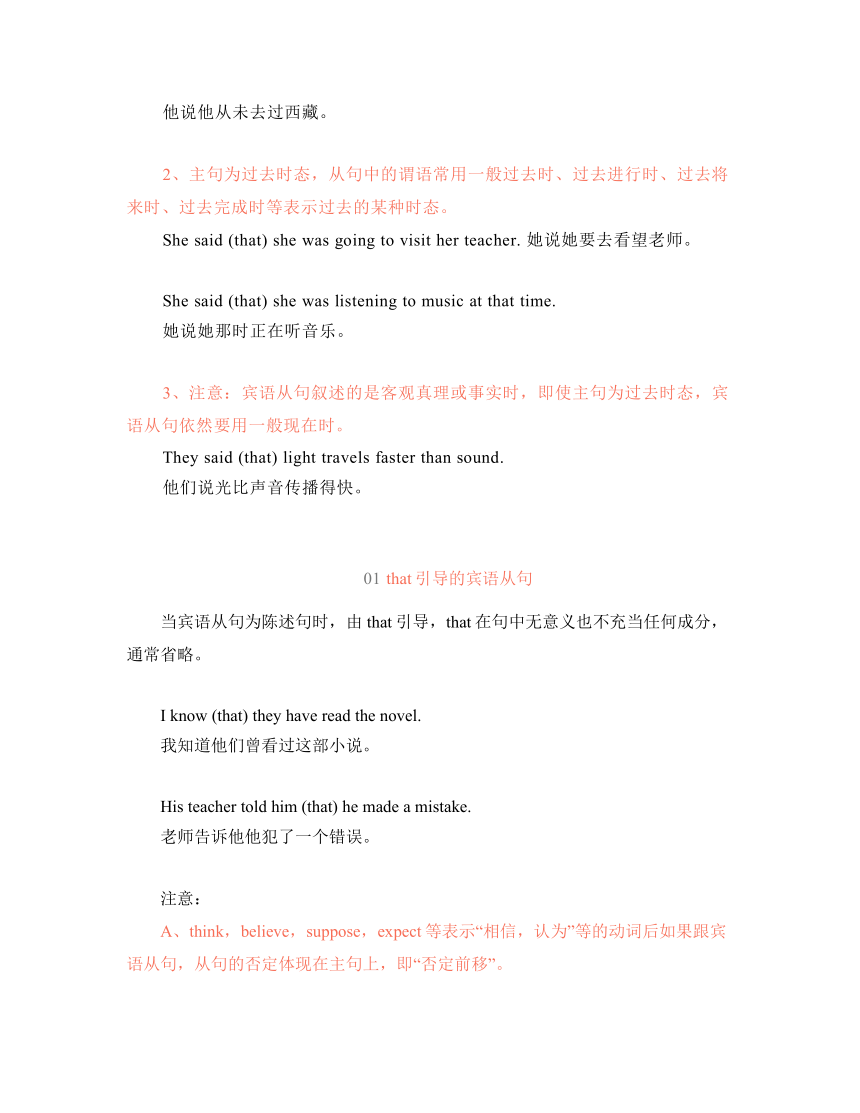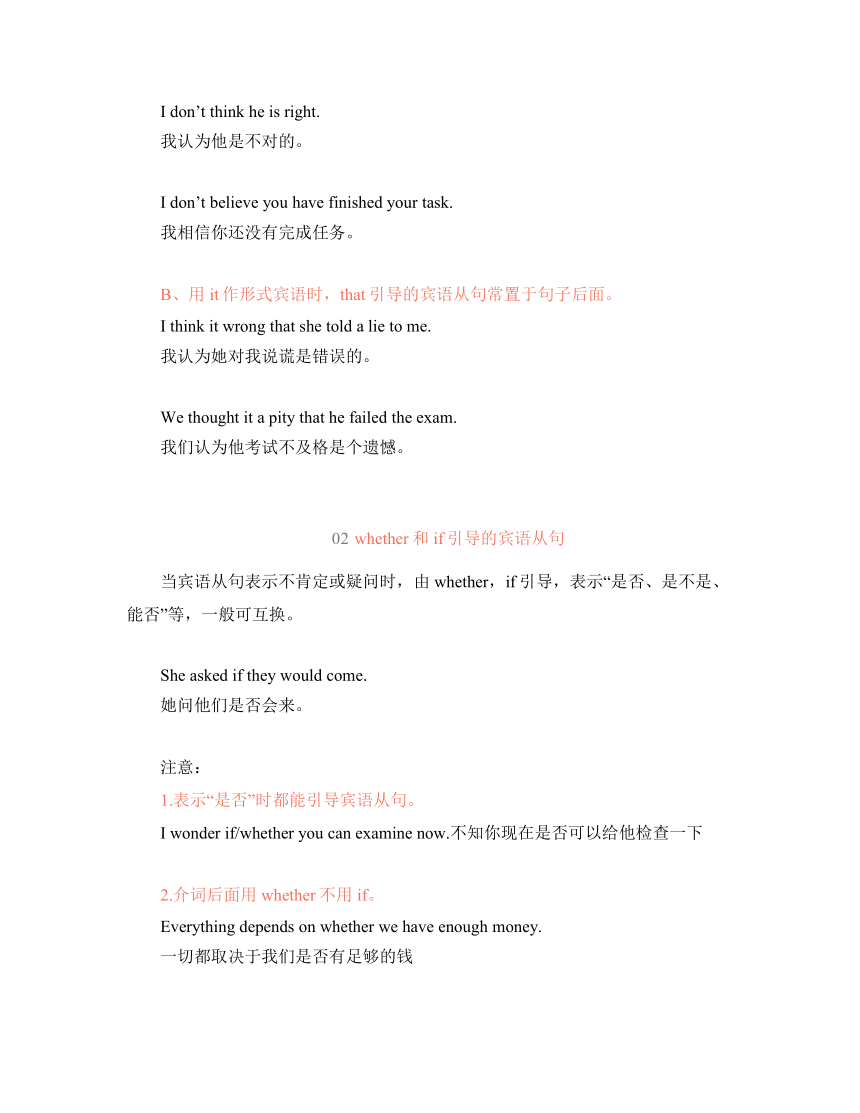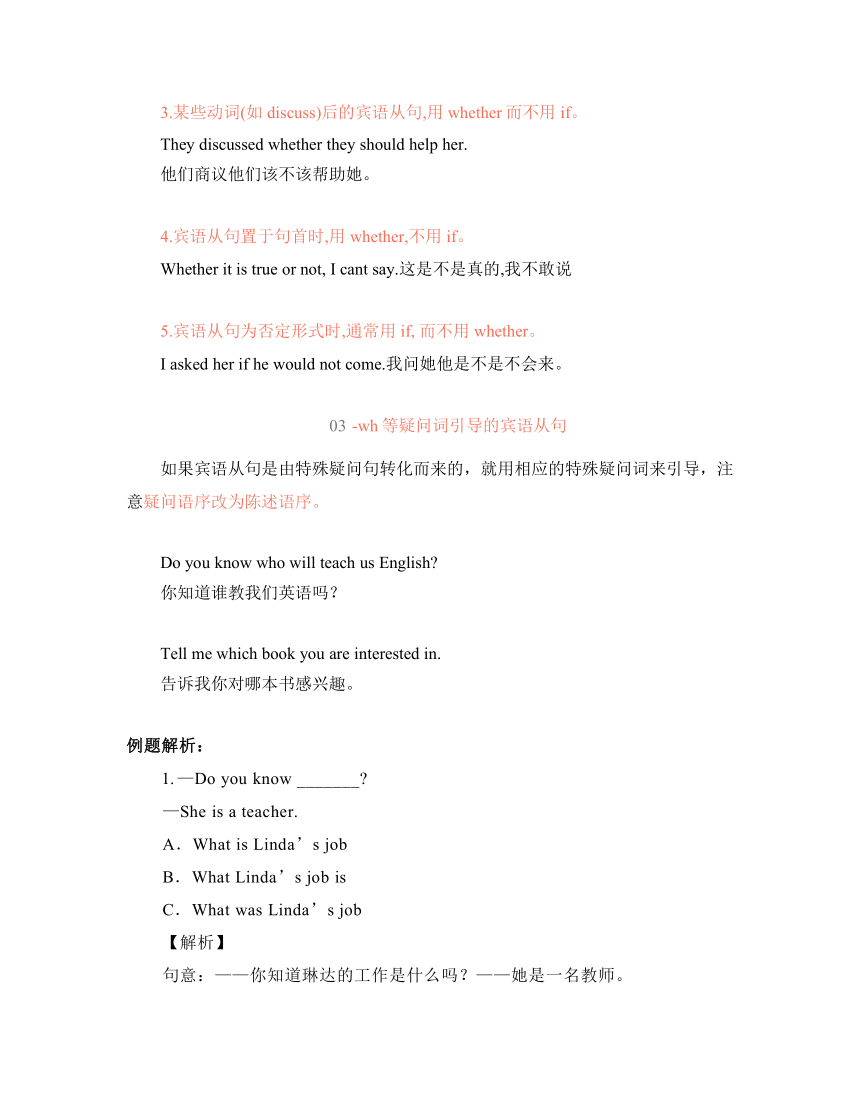宾语从句和同位语从句 语法考点总结(讲义)2024年中考英语 二轮复习语法专题
文档属性
| 名称 | 宾语从句和同位语从句 语法考点总结(讲义)2024年中考英语 二轮复习语法专题 |  | |
| 格式 | docx | ||
| 文件大小 | 23.9KB | ||
| 资源类型 | 教案 | ||
| 版本资源 | 通用版 | ||
| 科目 | 英语 | ||
| 更新时间 | 2023-10-22 19:23:00 | ||
图片预览




文档简介
2024届 九年级中考英语 二轮复习【语法专题】
宾语从句和同位语从句 语法考点总结(讲义)
宾语从句
概述
宾语从句在句子中起到宾语的作用。常见的引导词有that,whether,if,who,whose,what,which,when,where,how,why等。
She asked whose umbrella it was.
她问那是谁的伞。
Pay attention to what your teacher said in class.
注意你老师上课时所说的话。
Do you know who (whom) they are waiting for
你知道他们在等谁吗?
宾语从句的时态
宾语从句的时态必须与主句相呼应。
1、主句为一般现在时态,从句根据实际情况使用任何时态。
He says (that) he gets up early every day.
他说他每天早起。
He says (that) he will come here at five.
他说五点来这里。
He says (that) he has never been to Tibet.
他说他从未去过西藏。
2、主句为过去时态,从句中的谓语常用一般过去时、过去进行时、过去将来时、过去完成时等表示过去的某种时态。
She said (that) she was going to visit her teacher. 她说她要去看望老师。
She said (that) she was listening to music at that time.
她说她那时正在听音乐。
3、注意:宾语从句叙述的是客观真理或事实时,即使主句为过去时态,宾语从句依然要用一般现在时。
They said (that) light travels faster than sound.
他们说光比声音传播得快。
01 that引导的宾语从句
当宾语从句为陈述句时,由that引导,that在句中无意义也不充当任何成分,通常省略。
I know (that) they have read the novel.
我知道他们曾看过这部小说。
His teacher told him (that) he made a mistake.
老师告诉他他犯了一个错误。
注意:
A、think,believe,suppose,expect等表示“相信,认为”等的动词后如果跟宾语从句,从句的否定体现在主句上,即“否定前移”。
I don’t think he is right.
我认为他是不对的。
I don’t believe you have finished your task.
我相信你还没有完成任务。
B、用it作形式宾语时,that引导的宾语从句常置于句子后面。
I think it wrong that she told a lie to me.
我认为她对我说谎是错误的。
We thought it a pity that he failed the exam.
我们认为他考试不及格是个遗憾。
02 whether和if引导的宾语从句
当宾语从句表示不肯定或疑问时,由whether,if引导,表示“是否、是不是、能否”等,一般可互换。
She asked if they would come.
她问他们是否会来。
注意:
1.表示“是否”时都能引导宾语从句。
I wonder if/whether you can examine now.不知你现在是否可以给他检查一下
2.介词后面用 whether不用if。
Everything depends on whether we have enough money.
一切都取决于我们是否有足够的钱
3.某些动词(如 discuss)后的宾语从句,用whether而不用if。
They discussed whether they should help her.
他们商议他们该不该帮助她。
4.宾语从句置于句首时,用 whether,不用if。
Whether it is true or not, I cant say.这是不是真的,我不敢说
5.宾语从句为否定形式时,通常用if, 而不用whether。
I asked her if he would not come.我问她他是不是不会来。
03 -wh等疑问词引导的宾语从句
如果宾语从句是由特殊疑问句转化而来的,就用相应的特殊疑问词来引导,注意疑问语序改为陈述语序。
Do you know who will teach us English
你知道谁教我们英语吗?
Tell me which book you are interested in.
告诉我你对哪本书感兴趣。
例题解析:
—Do you know _______
—She is a teacher.
A.What is Linda’s job
B.What Linda’s job is
C.What was Linda’s job
【解析】
句意:——你知道琳达的工作是什么吗?——她是一名教师。
考查宾语从句。宾语从句要用陈述句语序,排除A/C选项,主句是一般现在时,从句时态不受限制,结合回答可知,询问现在的情况,应用一般现在时,故选B。
2. I wonder ________ .
A.that April is the hottest month in Thailand
B.do you know where I can buy some medicine
C.whether June is a good time to visit Gansu
D.how can I improve my pronunciation
【解析】
句意:我想知道六月是不是去甘肃旅游的好时机。
考查宾语从句。宾语从句要用陈述句语序,排除B/D选项;结合“I wonder”可知,从句应该是问一个问题,而that是引导陈述句,排除A选项,故选C。
3. —Could you please tell me ________
—You can take No. 2 Bus.
A.when was the nearest hospital built
B.how can I get to the nearest hospital
C.when the nearest hospital was built
D.how I can get to the nearest hospital
【解析】
句意:——你能告诉我怎么去最近的医院吗?——你可以坐2路公共汽车。
考查宾语从句。此处是宾语从句,从句用陈述语序,排除选项A、B;根据“You can take No. 2 Bus.”可知,此处询问交通方式,用how引导宾语从句。故选D。
同位语从句
概述
用作同位语的从句,叫同位语从句。它一般跟在某些名词(如fact, idea, news, promise,question,doubt,thought,hope,message,suggestion,possibility, decision等)的后面,用以说明或解释该名词表示的具体内容,引导同位语从句的引导词有that, whether,how, when, where,who,what等,如:
He has no idea when she will come back.
他不知道她何时会回来。
I heard the news that my sister had won the first prize.
我听到了消息,姐姐获得了第一名。
that引导的同位语从句
如果同位语从句意义完整,就用that引导。
The news that she won the first prize made her parents excited.
她获得一等奖的消息使得父母很激动。
whether引导的同位语从句
如果同位语从句意义需要添加“是否”才完整,就用whether引导。
They will discuss the problem whether the meeting will be held on time.
他们将讨论会议是否如期举行的问题。
疑问词引导的同位语从句
如果同位语从句需增加“什么时候”、“什么地点”、“什么方式”等意义才完整,就用相应的when,where,how等引导。
I have no idea how I should do it next.
我不知道下一步该怎么做。
同位语从句注意点
1、名词demand,proposal,suggestion等后面的同位语从句要用虚拟语气,从句谓语用“should+动词原形”,should可以省略。
The suggestion that the sports meeting (should) be canceled will be discussed this afternoon.
取消运动会的建议将在今天下午讨论。
2、同位语从句与定语从句的区别
同位语从句对名词加以补充说明,是名词全部内容的体现,且同位语从句的引导词不充当从句成分;定语从句是对名词加以修饰限定,是名词内容的修饰性定语,且定语从句的引导词充当从句成分。
My parents told me the news that they had arrived home.
父母告诉了我他们已经到家的消息。
(同位语从句)
My parents told me the news that/which was exciting.
父母告诉了我那个令人兴奋不已的消息。(定语从句)
宾语从句和同位语从句 语法考点总结(讲义)
宾语从句
概述
宾语从句在句子中起到宾语的作用。常见的引导词有that,whether,if,who,whose,what,which,when,where,how,why等。
She asked whose umbrella it was.
她问那是谁的伞。
Pay attention to what your teacher said in class.
注意你老师上课时所说的话。
Do you know who (whom) they are waiting for
你知道他们在等谁吗?
宾语从句的时态
宾语从句的时态必须与主句相呼应。
1、主句为一般现在时态,从句根据实际情况使用任何时态。
He says (that) he gets up early every day.
他说他每天早起。
He says (that) he will come here at five.
他说五点来这里。
He says (that) he has never been to Tibet.
他说他从未去过西藏。
2、主句为过去时态,从句中的谓语常用一般过去时、过去进行时、过去将来时、过去完成时等表示过去的某种时态。
She said (that) she was going to visit her teacher. 她说她要去看望老师。
She said (that) she was listening to music at that time.
她说她那时正在听音乐。
3、注意:宾语从句叙述的是客观真理或事实时,即使主句为过去时态,宾语从句依然要用一般现在时。
They said (that) light travels faster than sound.
他们说光比声音传播得快。
01 that引导的宾语从句
当宾语从句为陈述句时,由that引导,that在句中无意义也不充当任何成分,通常省略。
I know (that) they have read the novel.
我知道他们曾看过这部小说。
His teacher told him (that) he made a mistake.
老师告诉他他犯了一个错误。
注意:
A、think,believe,suppose,expect等表示“相信,认为”等的动词后如果跟宾语从句,从句的否定体现在主句上,即“否定前移”。
I don’t think he is right.
我认为他是不对的。
I don’t believe you have finished your task.
我相信你还没有完成任务。
B、用it作形式宾语时,that引导的宾语从句常置于句子后面。
I think it wrong that she told a lie to me.
我认为她对我说谎是错误的。
We thought it a pity that he failed the exam.
我们认为他考试不及格是个遗憾。
02 whether和if引导的宾语从句
当宾语从句表示不肯定或疑问时,由whether,if引导,表示“是否、是不是、能否”等,一般可互换。
She asked if they would come.
她问他们是否会来。
注意:
1.表示“是否”时都能引导宾语从句。
I wonder if/whether you can examine now.不知你现在是否可以给他检查一下
2.介词后面用 whether不用if。
Everything depends on whether we have enough money.
一切都取决于我们是否有足够的钱
3.某些动词(如 discuss)后的宾语从句,用whether而不用if。
They discussed whether they should help her.
他们商议他们该不该帮助她。
4.宾语从句置于句首时,用 whether,不用if。
Whether it is true or not, I cant say.这是不是真的,我不敢说
5.宾语从句为否定形式时,通常用if, 而不用whether。
I asked her if he would not come.我问她他是不是不会来。
03 -wh等疑问词引导的宾语从句
如果宾语从句是由特殊疑问句转化而来的,就用相应的特殊疑问词来引导,注意疑问语序改为陈述语序。
Do you know who will teach us English
你知道谁教我们英语吗?
Tell me which book you are interested in.
告诉我你对哪本书感兴趣。
例题解析:
—Do you know _______
—She is a teacher.
A.What is Linda’s job
B.What Linda’s job is
C.What was Linda’s job
【解析】
句意:——你知道琳达的工作是什么吗?——她是一名教师。
考查宾语从句。宾语从句要用陈述句语序,排除A/C选项,主句是一般现在时,从句时态不受限制,结合回答可知,询问现在的情况,应用一般现在时,故选B。
2. I wonder ________ .
A.that April is the hottest month in Thailand
B.do you know where I can buy some medicine
C.whether June is a good time to visit Gansu
D.how can I improve my pronunciation
【解析】
句意:我想知道六月是不是去甘肃旅游的好时机。
考查宾语从句。宾语从句要用陈述句语序,排除B/D选项;结合“I wonder”可知,从句应该是问一个问题,而that是引导陈述句,排除A选项,故选C。
3. —Could you please tell me ________
—You can take No. 2 Bus.
A.when was the nearest hospital built
B.how can I get to the nearest hospital
C.when the nearest hospital was built
D.how I can get to the nearest hospital
【解析】
句意:——你能告诉我怎么去最近的医院吗?——你可以坐2路公共汽车。
考查宾语从句。此处是宾语从句,从句用陈述语序,排除选项A、B;根据“You can take No. 2 Bus.”可知,此处询问交通方式,用how引导宾语从句。故选D。
同位语从句
概述
用作同位语的从句,叫同位语从句。它一般跟在某些名词(如fact, idea, news, promise,question,doubt,thought,hope,message,suggestion,possibility, decision等)的后面,用以说明或解释该名词表示的具体内容,引导同位语从句的引导词有that, whether,how, when, where,who,what等,如:
He has no idea when she will come back.
他不知道她何时会回来。
I heard the news that my sister had won the first prize.
我听到了消息,姐姐获得了第一名。
that引导的同位语从句
如果同位语从句意义完整,就用that引导。
The news that she won the first prize made her parents excited.
她获得一等奖的消息使得父母很激动。
whether引导的同位语从句
如果同位语从句意义需要添加“是否”才完整,就用whether引导。
They will discuss the problem whether the meeting will be held on time.
他们将讨论会议是否如期举行的问题。
疑问词引导的同位语从句
如果同位语从句需增加“什么时候”、“什么地点”、“什么方式”等意义才完整,就用相应的when,where,how等引导。
I have no idea how I should do it next.
我不知道下一步该怎么做。
同位语从句注意点
1、名词demand,proposal,suggestion等后面的同位语从句要用虚拟语气,从句谓语用“should+动词原形”,should可以省略。
The suggestion that the sports meeting (should) be canceled will be discussed this afternoon.
取消运动会的建议将在今天下午讨论。
2、同位语从句与定语从句的区别
同位语从句对名词加以补充说明,是名词全部内容的体现,且同位语从句的引导词不充当从句成分;定语从句是对名词加以修饰限定,是名词内容的修饰性定语,且定语从句的引导词充当从句成分。
My parents told me the news that they had arrived home.
父母告诉了我他们已经到家的消息。
(同位语从句)
My parents told me the news that/which was exciting.
父母告诉了我那个令人兴奋不已的消息。(定语从句)
同课章节目录
- 词法
- 名词
- 动词和动词短语
- 动词语态
- 动词时态
- 助动词和情态动词
- 非谓语动词
- 冠词
- 代词
- 数词和量词
- 形容词副词及其比较等级
- 介词和介词短语
- 连词和感叹词
- 构词法
- 相似、相近词比较
- 句法
- 陈述句
- 一般疑问句和否定疑问句
- 特殊疑问句及选择疑问句
- 反意疑问句
- 存在句(There be句型)
- 宾语从句
- 定语从句
- 状语从句
- 主谓一致问题
- 简单句
- 并列句
- 复合句
- 主谓一致
- 主、表语从句
- 名词性从句
- 直接引语和间接引语
- 虚拟语气
- 感叹句
- 强调句
- 倒装句
- 祈使句
- 句子的成分
- 句子的分类
- 题型专区
- 单项选择部分
- 易错题
- 完形填空
- 阅读理解
- 词汇练习
- 听说训练
- 句型转换
- 补全对话
- 短文改错
- 翻译
- 书面表达
- 任务型阅读
- 语法填空
- 其他资料
